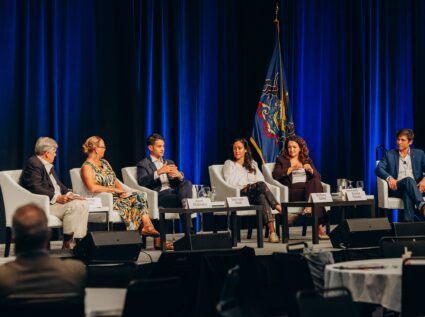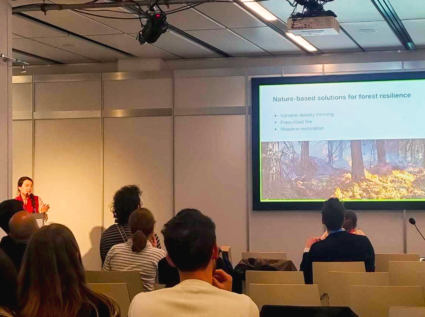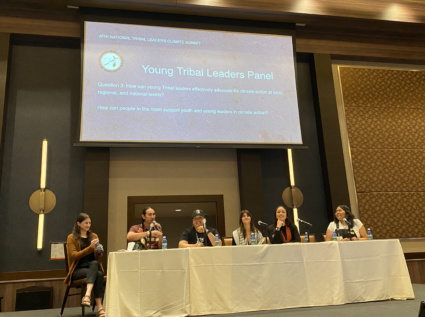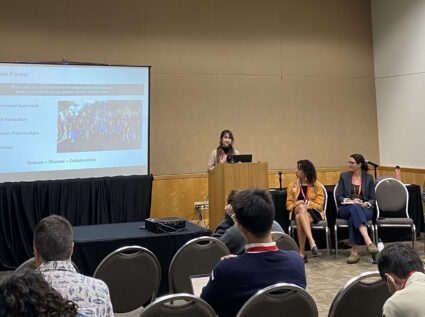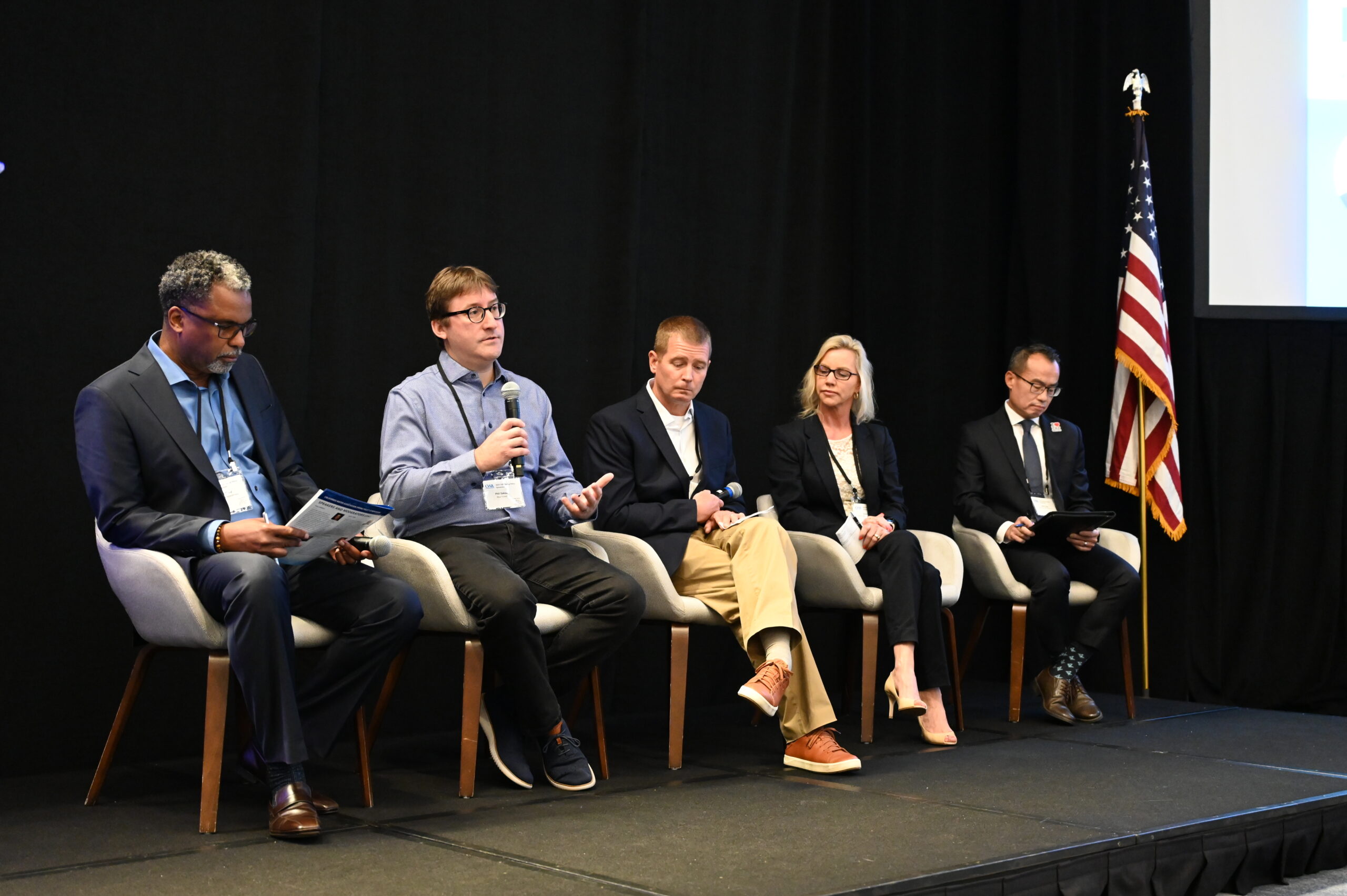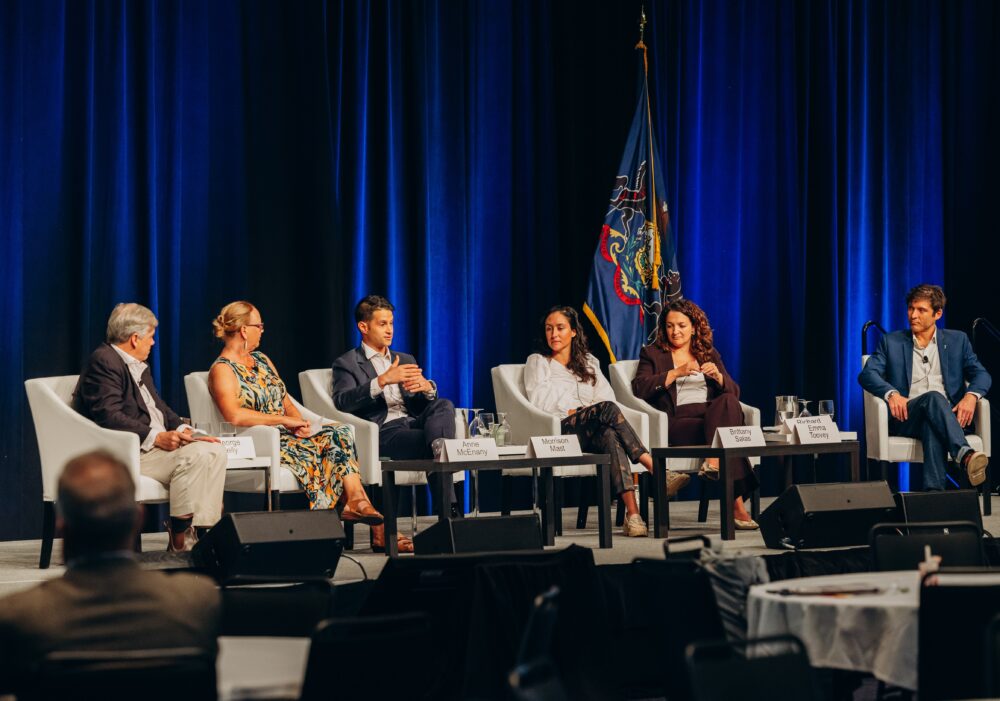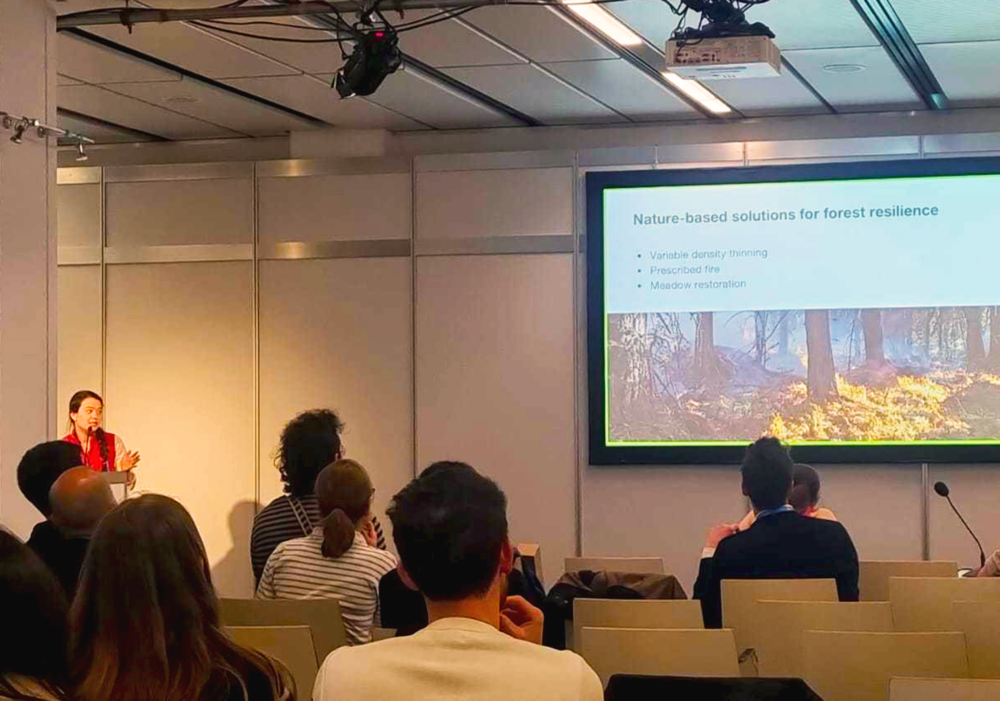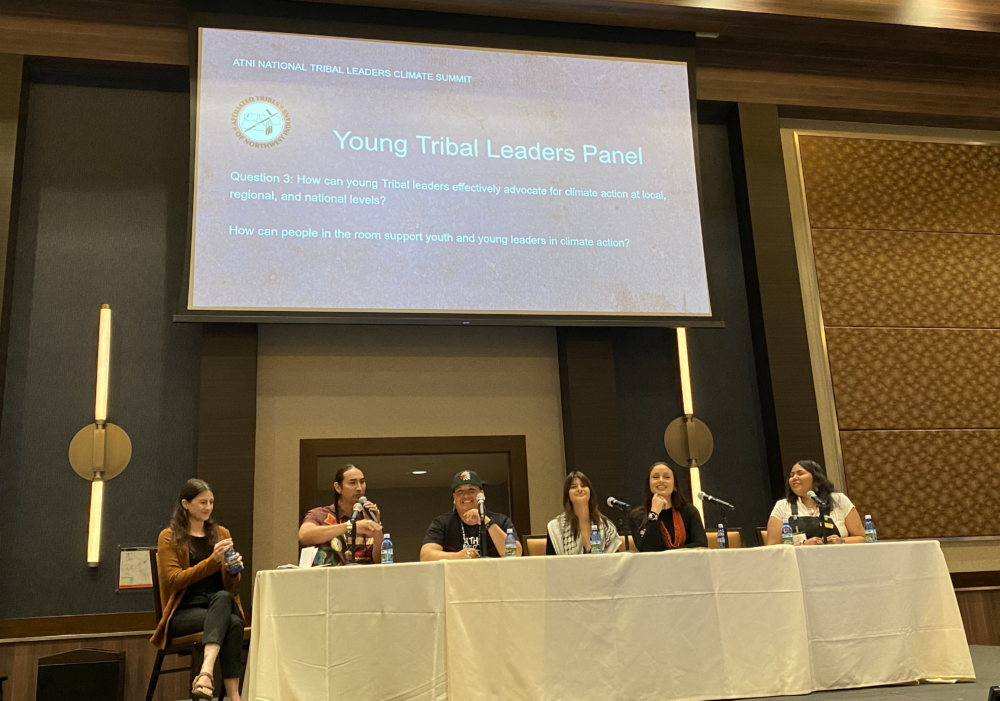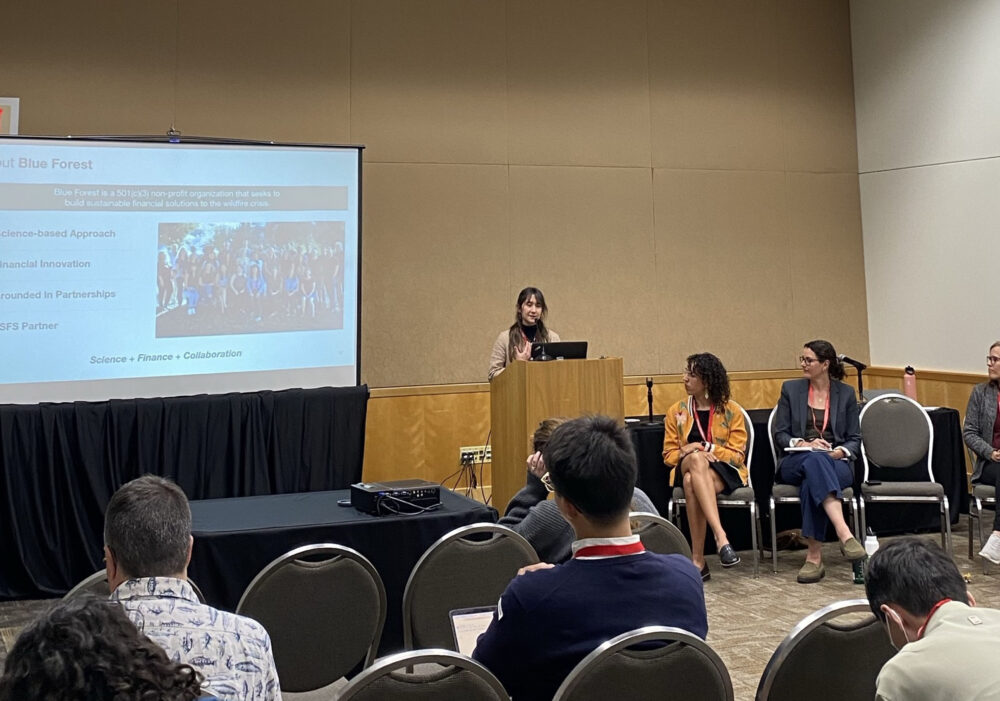Out and About: It’s Conference Season!


As a remote-first organization, conferences provide us an opportunity to meet in person with friends and colleagues, network, and most importantly, advance our work as we learn and share knowledge.
Written by: Jessica Alvarez, Communications & Content Manager
It’s conference season and they have kept us busy at Blue Forest! As a remote-first organization, conferences provide us an opportunity to meet in person with friends and colleagues, network, and most importantly, advance our work as we learn and share knowledge. One of our new values is a commitment to continuous learning, and conferences allow us to do just that.
Over the past month, members of our team have attended and spoken at a wide range of conferences nationally and internationally. These invitations to join important conversations addressing some of the world’s most pressing challenges are a nod to the value of our work in the field of conservation finance. We are honored to be recognized as leaders in this space and grateful for the opportunity to continue to innovate in our field.
We’re excited to share a few highlights:
Blue Forest took the main stage at this year’s Environmental Markets Conference in Pittsburgh, where Morrison Mast, Sr. Manager of International Programs, discussed where Blue Forest sits in the capital stack for nature conservation on a panel on Emerging Trends in Green Finance. The panel was moderated by George Kelly of Earth Recovery Partners and included panelists leveraging different types of capital for conservation, from Emma Toovey, whose private equity-backed Environment Bank is responding to the UK’s Biodiversity Net Gain regulations, to Anne McEnany, whose investment management firm Innovaciones Alumbra makes catalytic investments in nature-positive, community-based businesses including Blue Forest.
At the European Geosciences Union’s General Assembly in April, Director of Science Strategy Tessa Maurer presented on research Blue Forest has been pursuing with our partners at the U.S. Department of Agriculture Forest Service and Planet Labs on understanding the carbon and biodiversity co-benefits of large trees in the California Sierra Nevada. The audience of the session, titled “Nature-based solutions for climate change adaptation,” was particularly receptive to the tangible management suggestions that arose from our research, highlighting how to help landscapes transition in response to a changing climate. Following the presentations, the presenters had an informal discussion of the historical overlap of forest management and agriculture, as many forest management techniques around the world, including by Indigenous Tribes in California, supported the growth of food and medicinal plants. These techniques could provide a framework for climate- and ecosystem-friendly agroforestry techniques today.
Our Indigenous Partnerships Manager, Saraya Hamidi, joined the USDA Forest Service Conservation Finance Training for a panel alongside the World Resources Institute and the US Forest Service National Partnership Office on promoting equity in conservation finance projects. She also joined the Affiliated Tribes of Northwest Indians National Tribal Leaders Climate Change Summit for a conversation on “Empowering Tribal Youth in Climate Action,” where she shared her journey to begin work in the climate sector and discussed pathways for Tribal youth interested in pursuing opportunities in this space.
We made an appearance at SF Climate Week! Senior Scientist for Natural Capital Micah Elias joined the panel “Future of Co-Benefits in NCS Investments,” which focused on the future of nature-based solutions with a particular focus on biodiversity. “As is often true, conferences are a special opportunity to meet and see collaborators who I almost exclusively work with virtually,” shared Micah. The panel was an interesting mix of a leader in the nature based-solution space with Tanushree Bishwas, who is the Carbon Program Director for The Nature Conservancy, Blue Forest, with our quickly scaling model, and David Zangwill, Founder of Open Ecometrics, which is quickly making a name for itself in the biodiversity crediting space. The audience had insightful questions about how the biodiversity credit space was developing, pulling parallels and differences from carbon markets, and sharing perspectives about how the voluntary biodiversity market is growing.
Blue Forest was excited to participate in this year’s National Adaptation Forum in St. Paul, Minnesota. Anna Yip, Project Development Manager, participated in the Forum’s Equity and Climate Justice Subcommittee the year leading up to the event. She helped build a program that centered and elevated DEI and environmental justice through its speakers, sessions, activities, and attendees. Anna was also invited to participate on a panel titled “Nature as Critical Climate Infrastructure: Funding and Governance Strategies to Catalyze Large-Scale Action”. Speaking to a room full of climate adaptation leaders, practitioners, and specialists, panelists—including representatives from The Nature Conservancy, the Eastern Research Group, the County of Sonoma, and Blue Forest— shared findings from implementing nature-based solutions in broad geographies, and discussed opportunities and challenges regarding financing, funding, governance, and scaling as it relates to their work.
Huge thanks to the California Water Association for the invitation to join a panel discussion at their Spring Policy Symposium on Water and Wildfire Safety. The panelists, including Blue Forest Chief Scientist and Co-founder Phil Saksa, discussed strategies for building wildfire resilience in source watersheds and water infrastructure. Development of partnerships and relationships emerged as a key theme between utilities, land managers, FireSafe Councils, Emergency Services Agencies, and other organizations focused on wildfire preparedness and response. The group also discussed how that approach might be different for utilities that own land in their source watershed compared to working with other landowners or managers.
The Milken Institute recently hosted its 2024 Global Conference where Zach Knight, our CEO and Co-founder, joined a panel called “Recalibrating Climate Finance: A Mid-Course Correction for the Paris Agreement”. The panel examined the current state of climate finance, during which Zach spoke about public-private partnerships, nature-based solutions, and how the Blue Forest model is successfully being used to mitigate and reduce negative impacts from wildfire. He also had the opportunity to speak with Georgie Frost, BCG Studio journalist, about the work we do, how we do it, and new conservation finance opportunities. Watch the video below:
On behalf of the Blue Forest team, we would like to thank all our partners and the various organizations that have given Blue Forest a seat at the table where these impactful conversations are happening. Together, we increase the impact of our work and build a more resilient future.
